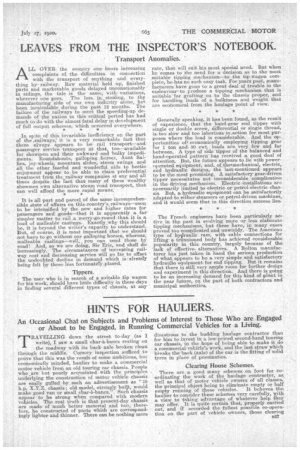LEAVES FROM THE INSPECTOR'S NOTEBOOK.
Page 25

If you've noticed an error in this article please click here to report it so we can fix it.
Transport Anomalies.
. Ar4.1 OVER. the country one hears increasing
complaints of the difficulties in connection with the transport of anything and everything byrailway. Raw material held up, finished parts and marketable goods delayed unconscionably ' in sidings, the tale is the same, with variations, wherever one goes. The loss, in stealing, to t4 manufacturing side of our own induotry alone,, has been incalculable during the past 12 months. The failure of the railways to meet the speeding-up demands of the nation in this critical period has had much to do with the almost fatal delay in development of full output schemes, which °mined everywhere.
In spite of this invariable inefficiency on the part of the ,.-railways; it is a very remarkable fact that there always appears to be rail transport—and. passenger service transport at that, too—available
• for showmen, and their awkward and bulkyimpedimenta. Roundabouts, galloping ;horses, Aunt Sallies, joy-wheels, mountain slides, steam swings and all the other fearful and 'wonderful aids to hectic, enjoyment appear to be able to claim preferential treatment from the railway companies at any and all times despite the fact that many of these wealthy showmen own alternative steam road transport, that can well afford the more rapid means. '
It is all part and parcel of the same incornprehensible state of affairs on this country's railways—soon to be intensified by the new and higher rates for passengers and goods—that it is apparently a. far' simpler matter to rail a merry-go-round. than it is a load of malleable castings Exactly,why•this should be, it is beyond the writer's capacity to understand. Put, of course, it is most important that we should not have to go without our galloping horses, whereas; malleable castings—well,, you can send those by road! And, so we are doing, Sir Eric, and shall do increasingly. The circumstances of increasing rail way cost and decreasing service *ill go far, to offset i the undoubted decline n demand which is already being felt by those less fortunatery placed.
. Tippers.
The user who is in search of a suitable tip wagon for his work, should have little difficulty in these days in finding several different types of chassis, at any • rate, that will suit his most special need. But when he comes to the need for a decision as to the most suitable tipping mechanism—to the tip-wagon complete, he has no such easy task. For years past, manufacturers have gone to a great deal of trouble in the endeavourto eroduce a tipping mechanism that is suitable 'for grafting on to the chassis proper, and for handling loads of a :bulkiness and weight that are economical from the haulage point of view.
Generally speaking, it has been found, as the result of experience, that the hand-gear end tipper with single or double screw, differential or single thread, is, too slow and too laborious in. action for most purposes where the load is considerable. And the opportunities oft. economically employing tipping gear for 1 ton and 30 cwt. loads are, very few and far between. A type of side tipper of the balanced and hand-operated patternhas received a good deal of attention. But, the future.appears to lie with poweroperated equipment, and, of,thetmechanical, electric, and hydraulic designs, the last-mentioned appears to be the most promising. A satisfactory gear-driven tipper necessitates not inconsiderable complication in the driving mechanism. Electric-installations are necessarily limited to electric or. petrol-electric chassis. But, a hydraulic equipment can be satisfactorily adapted to either steamers or petrol-driven machines., and it would seem that in this direction success lies.
The French engineers have been particularly active in the past in evolving more or less elaborate tipping mechanisms, but these have, in many cases proved too complicated and unwieldy. The American type of hyilraulic ram, with cable connections fbr lifting a trunnioned body has achieved considerable popularity in this country, largely because of the 'lack of effective. alternatives. A Bolton manufacturer has just taken in hand the serious production of what_ appears to be a very simple and satisfactory hydraulic equipment for end tipping. But it remains that there is still, very ample room for further design and experiment in thia direction. And there is going to be an increasing demand for this kind of plant in the near future on the part of both contractors and municipal authorities.




























